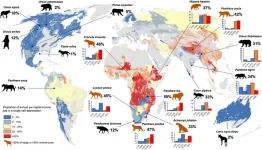(Press-News.org) Palliative care — a specialized medical care focused on quality of life for people with a serious illness such as cancer or heart failure — isn’t likely to reduce psychological distress, according to a Rutgers study.
Researchers involved with the study, published in the Journal of Pain and Symptom Management, found there were no statistically significant improvements in patient or caregiver anxiety, depression or psychological distress in a meta-analysis of 38 randomized clinical trials of palliative care interventions. This study took results from 38 previously published studies and combined them to examine the average effect of the interventions on psychological distress.
In palliative care, general psychosocial support is often offered, but this approach is less effective than evidence-based therapeutic interventions such as cognitive behavioral therapy. Palliative care interventions vary widely in terms of professional backgrounds of team members and use of evidence-based therapies for psychological distress.
Palliative care clinicians encounter psychological distress symptoms such as depression, sadness, anxiety, negative affect and fear among patients and their families regularly. Patients with cancers, heart failure and lung disease frequently experience increased depression symptoms as they approach the end of life.
Palliative care aims to identify, assess and manage pain and physical, psychological, social and spiritual concerns among patients experiencing serious illnesses and their families. However, the implementation of palliative care often has lacked fully integrating advances from psychological science and psychiatry to manage psychological distress.
Rutgers researchers, led by doctoral student Molly Nowels, utilized a protocol-based systematic review and meta-analysis to examine whether there are changes in psychological distress resulting from palliative care interventions.
The researchers uncovered no evidence to support the idea that palliative care interventions reduce psychological distress but did identify conceptual and methodological problems in the literature that could be remedied, such as including patients with existing mental health conditions in studies and increasing transparency and accountability through pretrial registration.
More work is needed to adapt and integrate evidence-based psychological interventions into studies of palliative care and evaluate outcomes in seriously ill populations. according to the researchers.
“We also found that over a third of randomized clinical trials included in our study excluded people with existing mental health conditions,” said Nowels. “This means that some of the people who might be most in need of palliative care’s integrative approach to suffering are not being represented in clinical trials, which could perpetuate inequalities for people with mental health conditions. We believe that researchers must include patients with existing mental health conditions in future palliative care intervention studies to improve the quality of care for this group.”
Other authors included Saurabh Kalra, Paul R. Duberstein, Emily Coakley, Biren Saraiya, Login George and Elissa Kozlov.
END
Palliative care doesn’t improve psychological distress
Palliative approaches don’t routinely integrate evidence-based advances from psychiatry and psychological science to address psychological symptoms, according to a Rutgers study
2023-02-24
ELSE PRESS RELEASES FROM THIS DATE:
Research brief: Verapamil shows beneficial effect on the pancreas in children with newly-diagnosed type 1 diabetes
2023-02-24
MINNEAPOLIS/ST. PAUL (02/24/2023) — Published in JAMA, a University of Minnesota led study shows that verapamil, a drug commonly used to treat high blood pressure and heart conditions, can have a beneficial effect on the pancreas in children with newly-diagnosed type 1 diabetes (T1D).
Results of the CLVer clinical trial showed that oral verapamil taken once a day improved the pancreas' insulin secretion by 30% over the first year following diagnosis of T1D when compared with a control group that received a placebo.
“The beneficial effect of verapamil observed in the trial is extremely exciting,” said Antoinette Moran, MD, the ...
A simpler way to track the spread of infectious diseases
2023-02-24
How society organizes affects different phenomena, from the transmission of information to the spread of contagious diseases. The more links we establish with each other via social and transportation networks, the more spread is favored. To study the dynamics of complex systems, such as society, we can infer these networks – in which nodes, representing individuals, connect through lines – from real-world data. However, these networks are usually large, dense, and cumbersome to manipulate.
In previous work, Luís M. Rocha’s group at the Instituto Gulbenkian de Ciência (IGC) found a way to simplify networks ...
Deadly waves: Researchers document evolution of plague over hundreds of years in medieval Denmark
2023-02-24
Attention editors: Under embargo by the journal Current Biology until Friday, February 24 at 11 a.m. eastern
Scientists who study the origins and evolution of the plague have examined hundreds of ancient human teeth from Denmark, seeking to address longstanding questions about its arrival, persistence and spread within Scandinavia.
In the first longitudinal study of its kind, focusing on a single region for 800 years (between 1000-1800AD), researchers reconstructed Yersinia pestis genomes, the bacterium responsible for the plague, and showed that it was reintroduced into the Danish population from other parts of Europe again and again, perhaps via ...
Current air pollution standards tied to higher heart risks
2023-02-24
OAKLAND, Calif. — Long-term exposure to air pollution is tied to an increased risk of having a heart attack or dying from heart disease — with the greatest harms impacting under-resourced communities, new Kaiser Permanente research shows.
The study, published February 24 in JAMA Network Open, is one of the largest to date to look at the effects of long-term exposure to fine particle air pollution, which is emitted from sources such as vehicles, smokestacks, and fires. Fine particle air pollution, also known as PM2.5, are fine particles that are 2.5 micrometers in diameter or smaller. The ...
Comparing transmission of COVID-19 in nightlife, household, health care settings
2023-02-24
About The Study: In this case series study that analyzed 44,000 confirmed COVID-19 cases in Tokyo, cases identified in nightlife settings were associated with a higher likelihood of spreading COVID-19 than household and health care cases. Surveillance and interventions targeting nightlife settings should be prioritized to disrupt COVID-19 transmission, especially in the early stage of an epidemic.
Authors: Michihiko Yoshida, Ph.D., of the Minato Public Health Center in Tokyo, is the corresponding author.
To access the embargoed study: Visit our For The Media website at this link https://media.jamanetwork.com/
(doi:10.1001/jamanetworkopen.2023.0589)
Editor’s ...
Association of long-term exposure to particulate air pollution with cardiovascular events
2023-02-24
About The Study: In this study including 3.7 million adults in California, long-term fine particulate air pollution (PM2.5) exposure at moderate concentrations was associated with increased risks of heart attack, ischemic heart disease mortality and cardiovascular disease mortality. The findings add to the evidence that the current regulatory standard is not sufficiently protective.
Authors: Stacey E. Alexeeff, Ph.D., of the Kaiser Permanente Division of Research in Oakland, California, is the corresponding author.
To access ...
Common pregnancy complications may slow development of infant in the womb, study finds
2023-02-24
Gestational diabetes and preeclampsia may be linked to slower biological development in infants, according to a new study led by USC.
The research, published today in JAMA Network Open, found that newborns exposed to these two pregnancy complications were biologically younger than their chronologic gestational age. The infants’ biological or “epigenetic” age is based on molecular markers in their cells.
The results raise intriguing questions about how common pregnancy complications may affect infants and health outcomes later in childhood. Could they create developmental delays? Could some exposures advance biological ...
Developing countries pay the highest price for living with large carnivores
2023-02-24
A team of researchers has highlighted human-wildlife conflict as one of the globe’s most pressing human development and conservation dilemmas.
New research published in Communications Biology looked at 133 countries where 18 large carnivores ranged, and found that a person farming with cattle in developing countries such as Kenya, Uganda or India were up to eight times more economically vulnerable than those living in developed economies such as Sweden, Norway or the U.S.
Duan Biggs from Northern Arizona University’s School of Earth and Sustainability is the senior author of the study. He partnered with organizations throughout the world to conduct ...
Head injuries could be a risk factor for developing brain cancer
2023-02-24
Researchers from the UCL Cancer Institute have provided important molecular understanding of how injury may contribute to the development of a relatively rare but often aggressive form of brain tumour called a glioma.
Previous studies have suggested a possible link between head injury and increased rates of brain tumours, but the evidence is inconclusive. The UCL team have now identified a possible mechanism to explain this link, implicating genetic mutations acting in concert with brain tissue inflammation to change the behaviour of cells, making them more likely to become cancerous. Although this study was largely carried out in mice, it suggests ...
New study reveals biodiversity loss drove ecological collapse after the “Great Dying”
2023-02-24
SAN FRANCISCO, CA (February 24, 2023) — The history of life on Earth has been punctuated by several mass extinctions, the greatest of these being the Permian-Triassic extinction event, also known as the “Great Dying”, which occurred 252 million years ago. While scientists generally agree on its causes, exactly how this mass extinction unfolded—and the ecological collapse that followed—remains a mystery. In a study published today in Current Biology, researchers analyzed marine ecosystems before, during, and after the Great Dying ...
LAST 30 PRESS RELEASES:
Molecular glue discovery: large scale instead of lucky strike
Insulin resistance predictor highlights cancer connection
Explaining next-generation solar cells
Slippery ions create a smoother path to blue energy
Magnetic resonance imaging opens the door to better treatments for underdiagnosed atypical Parkinsonisms
National poll finds gaps in community preparedness for teen cardiac emergencies
One strategy to block both drug-resistant bacteria and influenza: new broad-spectrum infection prevention approach validated
Survey: 3 in 4 skip physical therapy homework, stunting progress
College students who spend hours on social media are more likely to be lonely – national US study
Evidence behind intermittent fasting for weight loss fails to match hype
How AI tools like DeepSeek are transforming emotional and mental health care of Chinese youth
Study finds link between sugary drinks and anxiety in young people
Scientists show how to predict world’s deadly scorpion hotspots
ASU researchers to lead AAAS panel on water insecurity in the United States
ASU professor Anne Stone to present at AAAS Conference in Phoenix on ancient origins of modern disease
Proposals for exploring viruses and skin as the next experimental quantum frontiers share US$30,000 science award
ASU researchers showcase scalable tech solutions for older adults living alone with cognitive decline at AAAS 2026
Scientists identify smooth regional trends in fruit fly survival strategies
Antipathy toward snakes? Your parents likely talked you into that at an early age
Sylvester Cancer Tip Sheet for Feb. 2026
Online exposure to medical misinformation concentrated among older adults
Telehealth improves access to genetic services for adult survivors of childhood cancers
Outdated mortality benchmarks risk missing early signs of famine and delay recognizing mass starvation
Newly discovered bacterium converts carbon dioxide into chemicals using electricity
Flipping and reversing mini-proteins could improve disease treatment
Scientists reveal major hidden source of atmospheric nitrogen pollution in fragile lake basin
Biochar emerges as a powerful tool for soil carbon neutrality and climate mitigation
Tiny cell messengers show big promise for safer protein and gene delivery
AMS releases statement regarding the decision to rescind EPA’s 2009 Endangerment Finding
Parents’ alcohol and drug use influences their children’s consumption, research shows
[Press-News.org] Palliative care doesn’t improve psychological distressPalliative approaches don’t routinely integrate evidence-based advances from psychiatry and psychological science to address psychological symptoms, according to a Rutgers study



